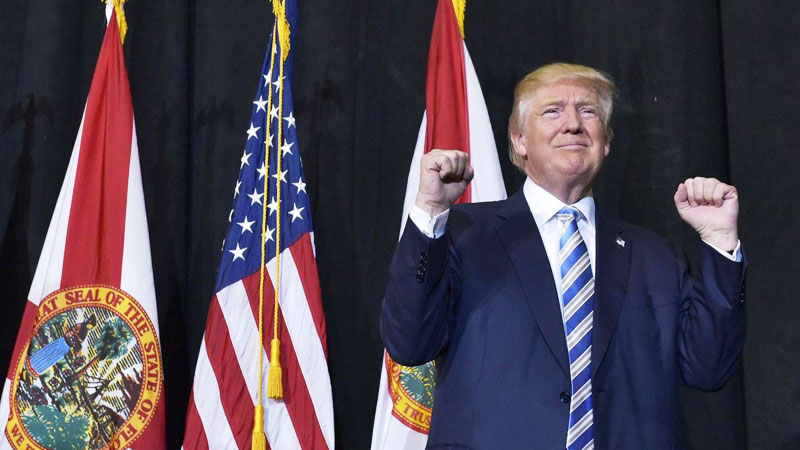Trump becomes 45th President
Wed 09 Nov 2016, 13:24:58

Republican Donald Trump stunned the world on Tuesday by defeating heavily favored Hillary Clinton in the race for the White House, ending eight years of Democratic rule and sending the United States on a new, uncertain path.
A wealthy real-estate developer and former reality TV host, Trump rode a wave of anger toward Washington insiders to defeat Clinton, whose gold-plated establishment resume includes stints as a first lady, U.S. senator and secretary of state.
Worried a Trump victory could cause economic and global uncertainty, investors were in full flight from risky assets such as stocks. In overnight trading, S&P 500 index futures fell 5 percent to hit their so-called limit down levels, indicating they would not be permitted to trade any lower until regular U.S. stock market hours on Wednesday.
The Associated Press and Fox News projected that Trump had collected just enough of the 270 state-by-state electoral votes needed to win a four-year term that starts on Jan. 20, taking battleground states where presidential elections are traditionally decided.
CNN reported Clinton had called Trump to concede concede the election. A short time earlier, Clinton campaign chairman John Podesta told supporters at her election rally in New York to go home. "Several states are too close to call so we're not going to have anything more to say tonight," he said.Victorious in a cliffhanger race that opinion polls had forecast was Clinton's to win, Trump won avid support among a core base of white non-college educated workers with his promise to be the "greatest jobs president that God ever created."
His win
raises a host of questions for the United States at home and abroad. He campaigned on a pledge to take the country on a more isolationist, protectionist "America First" path. He has vowed to impose a 35 percent tariff on goods exported to the United States by U.S. companies that went abroad.
raises a host of questions for the United States at home and abroad. He campaigned on a pledge to take the country on a more isolationist, protectionist "America First" path. He has vowed to impose a 35 percent tariff on goods exported to the United States by U.S. companies that went abroad.
Both candidates, albeit Trump more than Clinton, had historically low popularity ratings in an election that many voters characterized as a choice between two unpleasant alternatives.
Trump, who at 70 will be the oldest first-term U.S. president, came out on top after a bitter and divisive campaign that focused largely on the character of the candidates and whether they could be trusted to serve as the country's 45th president.
The presidency will be his first elected office, and it remains to be seen how he will work with Congress. During the campaign Trump was the target of sharp disapproval, not just from Democrats but from many in his own party.Television networks projected Republicans would retain control of the U.S. House of Representatives, where all 435 seats were up for grabs. In the U.S. Senate, the party also put up an unexpectedly tough fight to protect its majority in the U.S. Senate.
Trump entered the race 17 months ago and survived a series of seemingly crippling blows, many of them self-inflicted, including the emergence in October of a 2005 video in which he boasted about making unwanted sexual advances on women. He apologized but within days, several women emerged to say he had groped them, allegations he denied. He was judged the loser of all three presidential debates with Clinton.
No Comments For This Post, Be first to write a Comment.
Most viewed from Specials
Most viewed from World
AIMIM News
Latest Urdu News
Most Viewed
May 26, 2020
Do you think Canada-India relations will improve under New PM Mark Carney?
Latest Videos View All
Like Us
Home
About Us
Advertise With Us
All Polls
Epaper Archives
Privacy Policy
Contact Us
Download Etemaad App
© 2025 Etemaad Daily News, All Rights Reserved.






















.jpg)
.jpg)
.jpg)

















